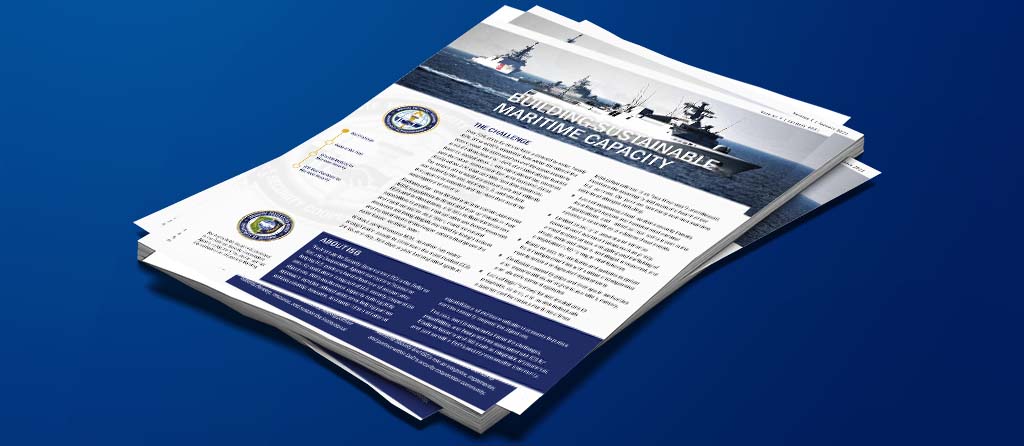ISG "Smart Sheets" Seek to Initiate Institutional Capacity Building Conversations - Defense Security Cooperation University

2021: Quarter 2 - Feb 2, 2021
ISG "Smart Sheets" Seek to Initiate Institutional Capacity Building Conversations
By Emily Bruza and ISG Faculty
The Institute for Security Governance (ISG) has released five "Smart Sheets," the first in a series of Institutional Capacity Building (ICB) documents that answer frequently asked security cooperation questions. Institutional Capacity Building encompasses security cooperation activities that support partner efforts to establish or improve institutional policies and processes necessary to plan, develop, resource, acquire, staff, employ, and sustain capabilities of mutual benefit. The Smart Sheets support efficient and effective government work, and if successful, they should inform, ignite, and invite conversation around Institutional Capacity Building.
ISG, the Defense Security Cooperation Agency’s (DSCA) leading ICB institute, designed the Smart Sheets to inform USG stakeholders and partner institutions about specific ICB functional or issue areas. The Smart Sheets were a collaborative effort between both academic and technical teams within ISG. The Tiger Team included ISG representatives from Advising and Consulting (A&C), Innovation and Learning (I&L), Education and Professional Practice (E&PP), and Peace and Security (P&S). In addition to in-house experts, the team also sought outside feedback from multiple Security Cooperation Organizations (SCOs) and the broader DOD community. The result is a set of concise, accessible, single-topic documents that address questions or challenges faced by the security cooperation community.
The Smart Sheets support efficient and effective government work, and if successful, they should inform, ignite, and invite conversation around Institutional Capacity Building.
The Smart Sheets are communal tools that allow cooperative work towards a common understanding of ICB concepts and solutions and create talking points about real-time and practical issues faced by our partners. One of the intentions behind the project was to identify areas of operation that could be improved strategically to ensure the successful use of partner capabilities. While there are many systemic issues that cannot be fixed quickly, the Smart Sheets aim to make security cooperation more accessible, to help our colleagues identify barriers to success, and to implement change for our partners at the unit, tactical, and operational level.
Each of the first five Smart Sheets presents a specific challenge, the current state of the field, the role ICB plays in resolving the challenge, and best practice recommendations. The first five topics were chosen by the Tiger Team because they represent areas in which ISG possesses a level of expertise, and where there is a need for additional ICB training and execution. They offer guidance on, and open conversation around, Maritime Security, Logistics, Cybersecurity, Civilian-Military Relationships, and ICB as it relates to Capability Development.
The Institutional Capacity Building Smart Sheet reiterates the idea that ICB is an essential role in all successful partnerships. It discusses the importance of ICB being implemented in the planning stages to ensure successful project execution by proactively supplying partners with training, equipment, and infrastructure up front. In order to assess the ICB needs of the partner, instead of just providing tactical support, this Smart Sheet also offers examples of ICB considerations for security operations planning.

The Building Enduring Logistics Institutions Smart Sheet addresses the need for clear logistical consideration and support when building relationships with partner nations. In order to maintain long-term partner sustainability, ICB is imperative when it comes to logistics because it is often where institutional capacity gaps occur. To protect U.S. investments and maintain positive relationships, it is crucial that partner nations are taught and equipped to maintain successful logistics systems. This is not the type of training that can be covered in a week-long course; it requires long-term planning and collaboration on security cooperation strategies.

The Building Sustainable Maritime Capacity Smart Sheet discusses maritime domain awareness and many of our partner nations’ need for patrol assets. Capacity building outside of simply supplying boats and equipment is especially important as many nations do not have the capabilities to protect their waters from issues other than defense, such as illegal fishing and human trafficking. ICB is especially important because maritime support often includes expensive equipment that requires regular maintenance and software updates.

The Building Capable Cybersecurity Institutions Smart Sheet represents one of the most important and challenging areas for ICB. Cybersecurity is complex and ever-changing; cyberattacks can wreak havoc on global supply chains, communications, and military technology, making capacity building among partner nations paramount for national and global security. The opportunities to open dialogue and keep this sheet up to date with the most current practices in cybersecurity are exciting and extensive.

The Building Durable Civilian-Military Relationships Smart Sheet illustrates another important area that is dependent upon ICB. In order to support partners that are aligned with U.S. interests, there are plenty of opportunities to enhance ICB in the civil-military realm, including longer training engagements, clearly delineated roles, and equipping partner nations with the tools they need to keep those roles filled and their employees properly trained.

The final page of each Smart Sheet defines the DOD’s approach to ICB, principles of effective ICB, and a flowchart for moving from problem to solution using security cooperation planning and engagement. The fourth page also outlines ISG's ICB offerings and select services, and lists partner planners and implementers. Currently the Smart Sheets provide relevant, ICB-related information to SCOs, but there are countless opportunities for the Smart Sheets to evolve as they open lines of communication in the security cooperation community.
A team of ISG experts will be monitoring the "Ask an Expert" email account linked at the end of each Smart Sheet, ready to answer ICB questions and take comments and feedback on each topic. The team hopes that the conversations generated will result in new Smart Sheets, and in positive changes to the existing Smart Sheets. Upcoming topics the team would like to see include Resilience, Political Will, and Women, Peace, and Security.
The Smart Sheets are cornerstone, iterative documents that demonstrate the institutionalization of ICB concepts. Having a clearly defined ICB goal, and providing the training and equipment to fulfill that role effectively, efficiently, and repeatedly, provides strategic oversight to the security cooperation community. As the field evolves and as we continue to meet new needs, ISG will be able to evolve and expand upon the Smart Sheets project, building a body of knowledge that adapts to meet the needs of the security cooperation workforce and the greater ICB community.

